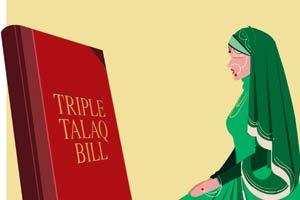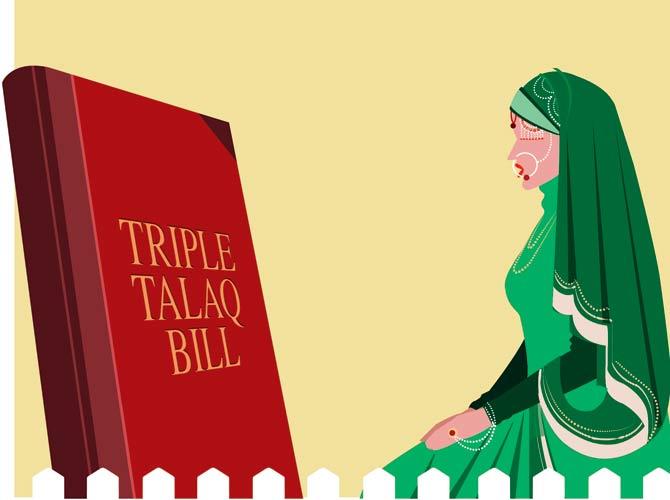As many Muslim women want the triple talaq Bill to be scrapped, some say amendments are the need of the hour


Illustration/Ravi Jadhav
ADVERTISEMENT
The minute we start thinking that India has finally managed to do away with triple talaq, something more worrying has come to the fore. The intention behind abolishing instant talaq and implementing The Muslim Women (Protection of Rights on Marriage) Bill, 2017, was to protect the rights of Muslim women and give them a life they are entitled to. But with thousands of women taking to the streets to protest against the provisions of the Bill, the question that arises at the moment is whether the country is dealing with Muslim divorce in a dignified manner. mid-day takes a look at how other countries, where triple talaq has been banned, deal with divorce, and whether India has something to learn.
The triple talaq Bill
On December 28, 2017, the Muslim Women (Protection of Rights on Marriage) Bill, 2017, was introduced in the Lok Sabha. After a day of discussion, the LS passed the Bill rejecting a number of amendments moved by various Opposition members. The draft Bill says, "Any pronouncement of talaq by a person upon his wife, by words, either spoken or written or in electronic form or in any other manner whatsoever, shall be void and illegal." It also has a provision of three years of imprisonment and a fine, and makes the pronouncement of talaq-e-biddat a non-bailable offence. However, the Bill still awaits Rajya Sabha's approval to become an Act.
The instant talaq
Triple talaq, also known as talaq-e-biddat or instant divorce, is the practice under which a Muslim man can divorce his wife by saying the word talaq three times in oral, written or electronic form. It has been prevalent among India's Muslim community, the majority of whom follow the Hanafi Islamic School of Law. This form of divorce has been called out as a misrepresentation of what has been written in the Quran. Many Islamic schools of thought prefer deferring the process over a period of three months.
Talaq reforms elsewhere
Pakistan: The Muslim Family Laws Ordinance was passed in 1961, under which, a man seeking divorce has to pronounce talaq and approach the chairman of the state-appointed Union Council, which then takes the case forward for arbitration and possible reconciliation.
Morocco: The Moroccan Family Code, which was passed in 2004, gives equal rights to the husband and wife.
Egypt: The first country to bring changes in its divorce system, Egypt implemented the reforms based on the interpretation of the Quran by 13th century scholar Ibn Taymiyyah. According to him, saying talaq three times in one go accounts for only one step in the process, which is followed by a 90-day waiting period.
Tunisia: According to the Tunisian Code of Personal Status, 1956, a man cannot divorce his wife verbally without consulting a judge.
Sri Lanka: As per Sri Lanka's Marriage and Divorce (Muslim) Act, 1951, a man who wants to divorce his wife has to first give notice to the Muslim judge, who, along with the couple's relatives and other Muslims, tries reconciliation.
Iraq: According to Iraq's Personal Status law, "three verbal repudiations pronounced at once will count as only one divorce."
Women prefer talaq-e-sunnah
Most Muslim women bodies want the community to adopt talaq-e-sunnah. According to this, the first step is to settle the differences through conversation. If the differences continue, then physical separation is prescribed. And if this doesn't work, then the man is asked to talk to his wife and make peace. If this also fails, then arbitration is followed. Only if all these don't work out, the man can say his first talaq.
When the woman gives talaq
There are two ways in which the wife can claim divorce - talaq-e-tafweez and talaq-e-khula. Under tafweez, the man assigns the power to give talaq to his wife. The second one happens at the request of the wife. But the man must accept the request, which means the woman has to give back the meher taken during marriage. There also needs to be an execution of the khulanama.
It's unconstitutional
On August 22, 2017, the Supreme Court banned the controversial Islamic practice as arbitrary and unconstitutional. Three of the five judges hearing the case had said that saying talaq three times violated women's rights. However, then Chief Justice of India J S Khehar and justice S Abdul wanted triple talaq to be suspended and the government asked to reform the practice.
Headline cases of triple 'T'
>> Shayara Bano was given a talaqnama by her husband in October 2015, after which she approached the Supreme Court with a petition questioning the legality of triple talaq. She has challenged the constitutionality of section 2 of the Muslim Personal Law (Shariat) Application Act, 1937. Her petition is being heard in SC.
>> On April 19, 2017, mid-day reported how Javed Khan divorced his wife Rukshana (name changed). He had left her at her mother's home in August 2016. She stayed there for months and he kept making excuses to not take her back. When he paid her a final visit on February 18, he threw a chit mentioning the divorce at her.
Inputs/Hemal Ashar
Also Read: Dr Asma Zahra Says Says The Flawed Triple Talaq Bill Will Make 'Things Difficult For Muslim Women'
Catch up on all the latest Mumbai news, crime news, current affairs, and also a complete guide on Mumbai from food to things to do and events across the city here. Also download the new mid-day Android and iOS apps to get latest updates
 Subscribe today by clicking the link and stay updated with the latest news!" Click here!
Subscribe today by clicking the link and stay updated with the latest news!" Click here!






